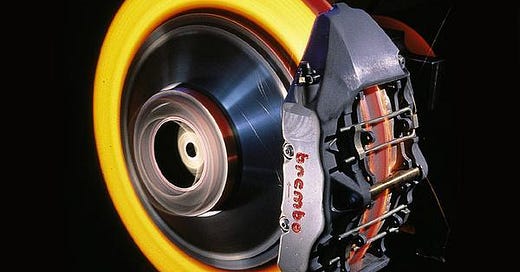“My brake pedal went to the floor with no warning and there was nothing I could do.”
Sorry, but I don’t buy that; I don’t agree that your brakes never gave you any warning. They always do… if you’re paying attention. Think of this as brake fade, and not brake failure.
The only time your brakes won’t give you some kind of warning is when the actual hose or hard line carrying brake fluid to the calipers breaks or is cut (or possibly a problem within the brake master cylinder). Otherwise, the brake pedal will feel different before there is some loss of braking power, giving you some warning.
Spend enough time driving on a race track, and you’re likely to either experience brake fade, or you already have.
Brake problems occur when you apply the brakes and, for a couple of different reasons that I’ll explain, the car does not slow down the way you expect. You can imagine what the result of this is….
But, why does it happen? There are two primary reasons and both are a result of too much heat:
If the brake system overheats from overuse, the hydraulic fluid will begin to boil. The temperatures we’re talking about here could be in the 600-700 degree Fahrenheit range and this creates and allows tiny air bubbles to form in the fluid (think of the air bubbles in a pot of boiling water). These air bubbles compress much more easily than the hydraulic brake fluid, so when you push on the brake pedal, it feels soft and mushy (and the pedal may even compress to the floor). And no matter how hard you push on this soft pedal, the car does not slow as much as usual because you’re not able to apply as much force to the brake pads as usual.
Brakes pads, and specifically the material that is in contact with the brake rotor when you’re braking, have an ideal operating temperature. If, through overuse, the pads become hotter than this ideal temperature, a type of gas will bleed out of the material and act almost as a lubricant between the pad and the rotor. And that, of course, is not a good thing as the friction between the pad and rotor is what’s supposed to be slowing you down. When this happens, the brake pedal feels solid – almost too solid. You push on it as hard as you want, but the car does not slow down as much as usual. This lack of friction, leading to a reduced braking force, is sometimes referred to as the brakes “having less bite.”
As you can see, in both cases, the brake fade is caused by overheating components of the brake system. The way brakes work is by converting friction into heat, so there is nothing wrong with them getting hot. But not too hot. And here’s the most important take-away: they don’t get hotter, hotter, hotter… and then suddenly fail completely.



